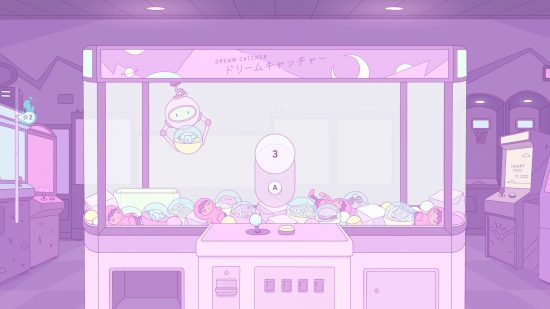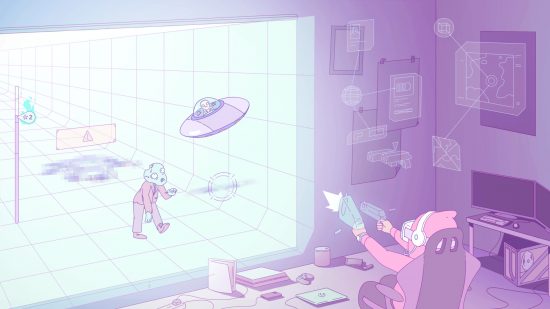Our Verdict
Melatonin is a dreamy rhythm game experience for newcomers to the genre and veterans alike. Prepare to sink some hours into this one, as I can guarantee it will have you hooked.
When I first heard about Melatonin, a pastel-coloured rhythm game based on dreams, I was immediately hooked. As someone who plays rhythm games religiously, I’m always looking for a new one to test my skills, and Melatonin does just that. This beautiful indie game from Half Asleep Games mixes the gameplay of Rhythm Heaven with the aesthetics of Bee and Puppycat and ties it all to a soundtrack of lo-fi beats to relax and unwind to.
In Melatonin, you play as a hoodie-wearing guy who keeps falling asleep on his sofa, and you travel into his dreams. Each dream is themed after something, like food and shopping, or more existential topics like the future and time itself. Each dream is a mini-game, teaching you a new audio or visual cue, and at the end of each night, you play a final dream combining the four mechanics you just learned.
Anyone familiar with the Rhythm Heaven series will recognise this level design, but Melatonin’s narrative feels completely different to those games. The final level of each night feels like that chaotic moment just before you wake up where all of your dreams meld into one big, confusing jumble. The game’s consistent pastel colour palette and stunning hand-drawn art make sure that this doesn’t feel too jarring though, while still making it challenging.

I’ve already mentioned the soundtrack, but it really deserves its own section. It’s definitely going to make it onto my Spotify Wrapped for next year, I can tell. Comprised of a combination of original tracks developed for the game, and licensed tracks from artists like Yotam Perel and Shindig, the dreamy soundscape pairs perfectly with the visuals of the game, and, in my opinion, is the backbone of the game’s narrative, given that there’s no dialogue.
As you can probably tell, I like Melatonin a lot. I’ve been craving a new Rhythm Heaven-style game on Switch for a while, as the narrative structure really suits me, plus it has a nostalgia factor. It’s perfect for playing in bed before heading downstairs on Christmas morning while visiting my parents. It’s truly a cosy game that feels like it’s made just for me – from the colours to the short bursts of gameplay, to the lo-fi soundtrack.
Weirdly enough, I also love that this game frustrates me. As I mentioned, I play a lot of rhythm games, so I always strive to not just clear songs, but full combo them. I usually expect to do this after a few tries, but Melatonin offers me a real challenge. I scored perfect on all of the first chapter fairly quickly, but the difficulty ramps up a lot quicker than I expected and remembering all of the different sound cues and patterns can be tricky. But considering all of this, it never makes me angry to have to revisit an earlier level to learn the mechanics again.

There were a couple of things I didn’t like about Melatonin, but absolutely none of them would dissuade me from recommending that you play it for yourself. The load times between chapters are super long, which for someone with ADHD like myself can put me off continuing to play. My other main issue is that the story is quite short. There are four chapters and a finale in total, and I managed to clear the levels with a high enough score to breeze through to the end in not much time at all. There’s definitely replayability as I still haven’t achieved three stars or perfect in everything, but there’s nowhere else to go.
Another way that Melatonin compensates for the short story is the level editor function. Once you pass a level on hard, you can access the level editor and make your own beat maps for each level. I imagine that this will lead to some crazy difficult levels from fans, and I hope that there will be a way to play community levels from both Switch and PC versions of the game.

One thing I always look for in games that I play is a range of accessibility features. Melatonin provides quite a few, including high-contrast visuals to make the cues more apparent against the pastel colour palette, and the option to keep the metronome noise from each level’s tutorial going during score mode. There’s no dialogue so there’s no need for subtitles, but I don’t believe there’s a way to play the game on Switch without using visuals.
Overall, I’m super glad that I got to play Melatonin, and I plan to spend a lot more time playing it to completion. I’m glad that a game as Dazcore as this one didn’t leave me disappointed, and I’m really looking forward to seeing what Half Asleep Games does next.
